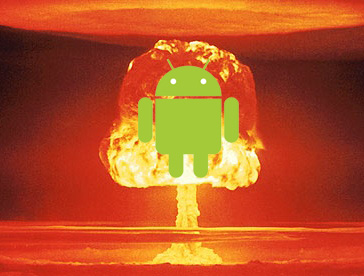
Naturally, HTC appealed the judgement to the six ITC commissioners, who will ultimately have the final say on the patent verdict. But it’s easily possible their decision, which is due by Dec. 6, will uphold the judge’s initial ruling.
[aditude-amp id="flyingcarpet" targeting='{"env":"staging","page_type":"article","post_id":310001,"post_type":"story","post_chan":"none","tags":null,"ai":false,"category":"none","all_categories":"business,mobile,","session":"C"}']The ruling is scary for competition because it could ultimately lead to the ban of all HTC Android devices and, to take things to the extreme, the ban of all Google Android phones and tablets. The two patents ruled to be infringing appear to be vital to the Android OS itself, so other companies’ Android products will be in Apple’s sights too.
“I have looked at those patents before and they appear to be very fundamental,” writes Florian Mueller of FOSS Patents. “They are very likely to be infringed by code that is at the core of Android. This could in a worst-case scenario result in an import ban against many or even all Android-based HTC products in the U.S. market.”
AI Weekly
The must-read newsletter for AI and Big Data industry written by Khari Johnson, Kyle Wiggers, and Seth Colaner.
Included with VentureBeat Insider and VentureBeat VIP memberships.
The two patents relate to how data is processed. The first patent is described as a “system and method for performing an action on a structure in computer-generated data,” which Apple says applies, for example, to tapping a phone number and being prompted options to call or look it up on the web. The second is described as a “real-time signal processing system for serially transmitted data,” which Apple says relates to data processed in real-time applications.
While the worst case scenario in this individual case is the ban of HTC Android products, Apple could use the same patents to attack all Android device manufacturers in court. Apple has already filed a compliant against Motorola with the same two patents, and there’s no telling which other companies could expect to see similar lawsuits.
Apple additionally has been in legal tussle with Samsung since April. The two companies have filed ITC complaints against each other with each asking for an import ban on the other’s products.
A less disastrous scenario for HTC would involve the company taking out certain features from its products and/or paying Apple licensing fees to use the patents, if Apple wants to offer that option. HTC is already paying licensing fees to Microsoft for every Android phone it sells, a strategy which seems to be paying off quite well for Microsoft. Paying out additional fees to Apple could end up being a major hit to HTC’s revenues, but it’s certainly better than some alternative outcomes.
Personally, I see strong competition between mobile manufacturers as an asset to the U.S. market, and the rivalry between platforms has created a wealth of smartphone options. Between the iPhone, Android, Windows Phone 7, and BlackBerry platforms, users have some great choices.
It would be an absolute shame if the strongest competitor to the iPhone was barred from the U.S. for having some OS similarities. I would rather see Apple win the mobile war by offering a better product — not a better legal strategy.
[aditude-amp id="medium1" targeting='{"env":"staging","page_type":"article","post_id":310001,"post_type":"story","post_chan":"none","tags":null,"ai":false,"category":"none","all_categories":"business,mobile,","session":"C"}']
VentureBeat's mission is to be a digital town square for technical decision-makers to gain knowledge about transformative enterprise technology and transact. Learn More